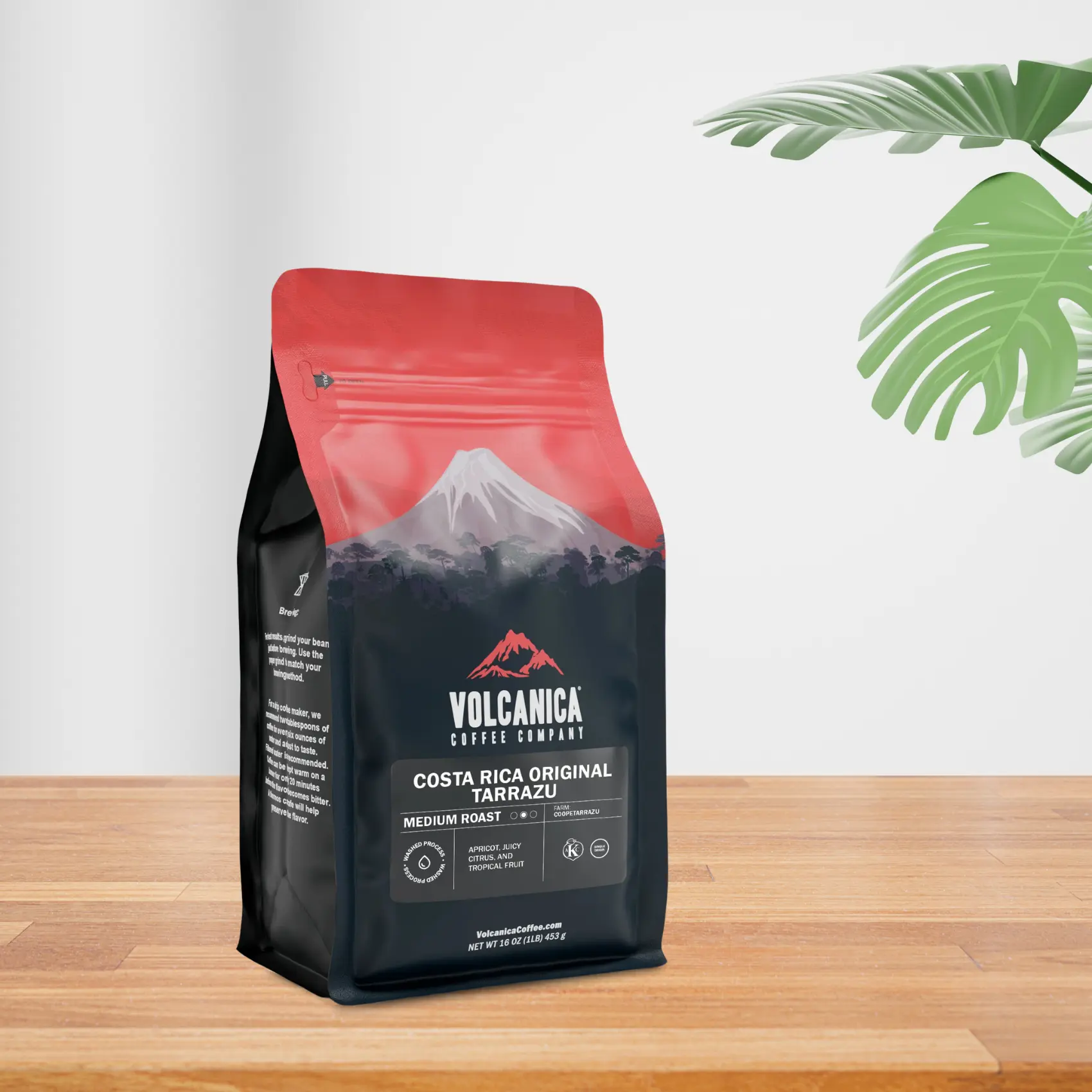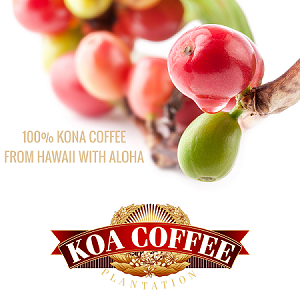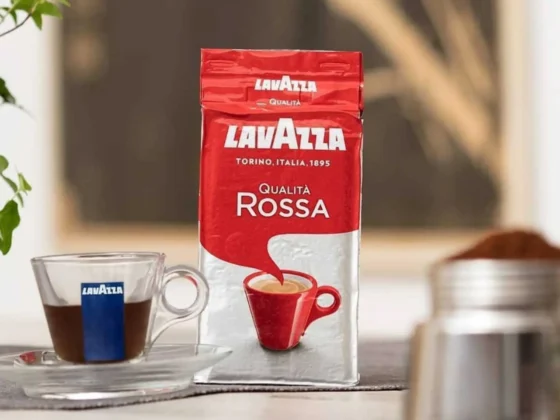In the realm of exceptional coffee, the best Costa Rica Tarrazú coffee holds a place of honor. Renowned for its rich aroma and exquisite flavor profile, this coffee originates from the lush, mountainous Tarrazú region of Costa Rica, a name synonymous with coffee excellence. This article delves into the heart of Tarrazú’s coffee culture, exploring the nuances that make it a celebrated choice among coffee enthusiasts worldwide. From the sun-kissed peaks of Costa Rica to your cup, we unravel the journey of Tarrazú coffee, highlighting the intricate processes and passionate people behind its production. Prepare to embark on an aromatic journey that celebrates the unique character and unparalleled quality of Costa Rica Tarrazú Coffee.
Feeling a bit lazy to read? Hit play and listen to the article below.
- Introduction & Key Takeaway
- https://app.mysoundwise.com/tracks/17023313698506597e.mp3
- Best Costa Rica Tarrazú Coffee Brands
- https://app.mysoundwise.com/tracks/17023314052745796e.mp3
- What is Costa Rica Tarrazú Coffee?
- https://app.mysoundwise.com/tracks/17023314475331477e.mp3
- The Art of Brewing the Perfect Cup of Tarrazú Coffee
- https://app.mysoundwise.com/tracks/17023315995855474e.mp3
- Sustainability and Ethical Practices in Tarrazú Coffee Production
- https://app.mysoundwise.com/tracks/17023316347451636e.mp3
- Conclusion & FAQs
- https://app.mysoundwise.com/tracks/17023316767129036e.mp3
Costa Rican Tarrazú Coffee: Key Takeaway
- Distinct Flavor: Costa Rica Tarrazú coffee is known for its vibrant acidity and rich flavor profile, influenced by the region’s volcanic soil and high altitude.
- Rich History: This coffee has deep historical roots in Costa Rica, playing a significant role in the country’s transition to a major coffee producer.
- Sustainable Production: Tarrazú coffee stands out for its commitment to environmental sustainability and ethical farming practices.
- Specialized Brewing: The unique brewing techniques, including the use of traditional chorreadors, are key to enhancing Tarrazú coffee’s distinct flavors.
- Global Acclaim: Recognized worldwide, Costa Rica Tarrazú coffee is celebrated for its high quality, earning accolades and favor among coffee enthusiasts.
Best Costa Rica Tarrazú Coffee Brands
When it comes to premium coffee, the best Costa Rica Tarrazú coffee brands stand out for their exceptional quality and rich, flavorful profiles. Known globally for its distinctive taste, Tarrazú coffee hails from one of the most revered coffee-growing regions in Costa Rica. This section will introduce you to the top brands that masterfully capture the essence of Tarrazú coffee, offering an unparalleled coffee experience that showcases the best of this renowned region.
Volcanica Single Origin Tarrazú Costa Rican Estate Coffee
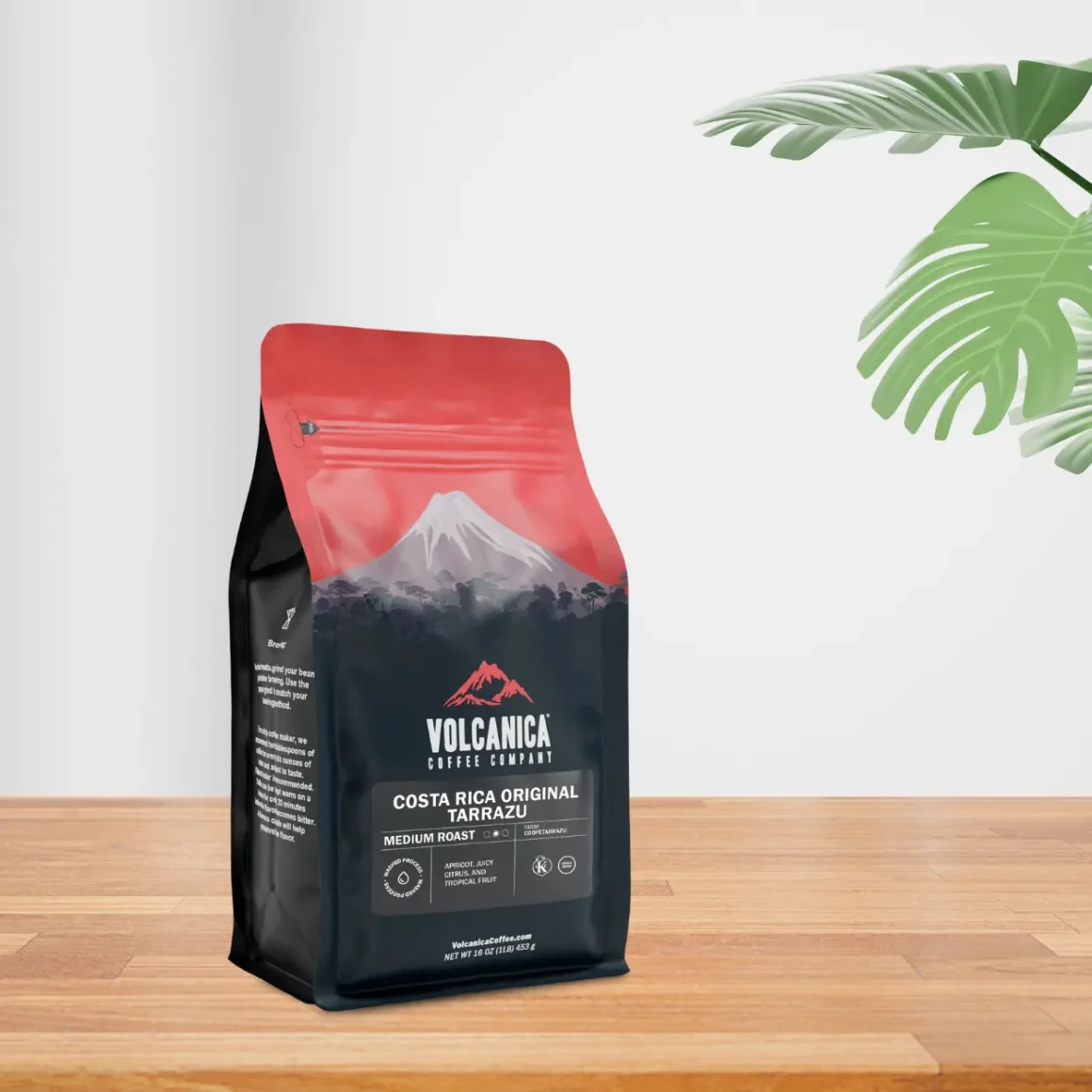
This coffee is perfect for connoisseurs who cherish a sophisticated palate. Its complex flavor profile with notes of tropical fruit, apricot and juicy citrus appeals to those who enjoy exploring nuanced tastes in their coffee. Additionally, the ethical certifications like Kosher and Rainforest Alliance make it an excellent choice for environmentally conscious and health-aware individuals. It’s particularly suited for those who appreciate the subtleties of a medium roast and the unique characteristics imparted by volcanic soil.
Features:
- Variety of Grinds: Available in whole bean, drip grind, espresso grind, and French press.
- Size Options: Comes in 16 oz., 3 lbs. (3 pack), and a 5 lb. bag.
- Flavor Notes: Tropical fruit, apricot and juicy citrus.
- Processing: Washed process ensures clean flavors.
- Roast: Medium roast to preserve natural flavors.
- Additional Information: Drying involves patio and mechanical methods; sourced from various smallholder Tarrazú farms; pH of 5.1.
Pros:
- Wide range of grind options caters to different brewing methods.
- Bulk purchase options offer convenience and savings.
- Complex flavor profile appealing to sophisticated palates.
- Ethical certifications like Kosher and Rainforest Alliance.
Cons:
- May be pricier than other brands.
- Flavor might be too complex for casual coffee drinkers.
Guru’s Insights:
This coffee is recommended for its authentic Costa Rican origin, superior taste, and commitment to sustainability. The volcanic soil of Tarrazú, coupled with the medium roast, brings out a rich and robust flavor, making it a top choice among the best Costa Rica Tarrazú coffee brands.
Costa Rican Tarrazú Coffee by Fresh Roasted Coffee LLC
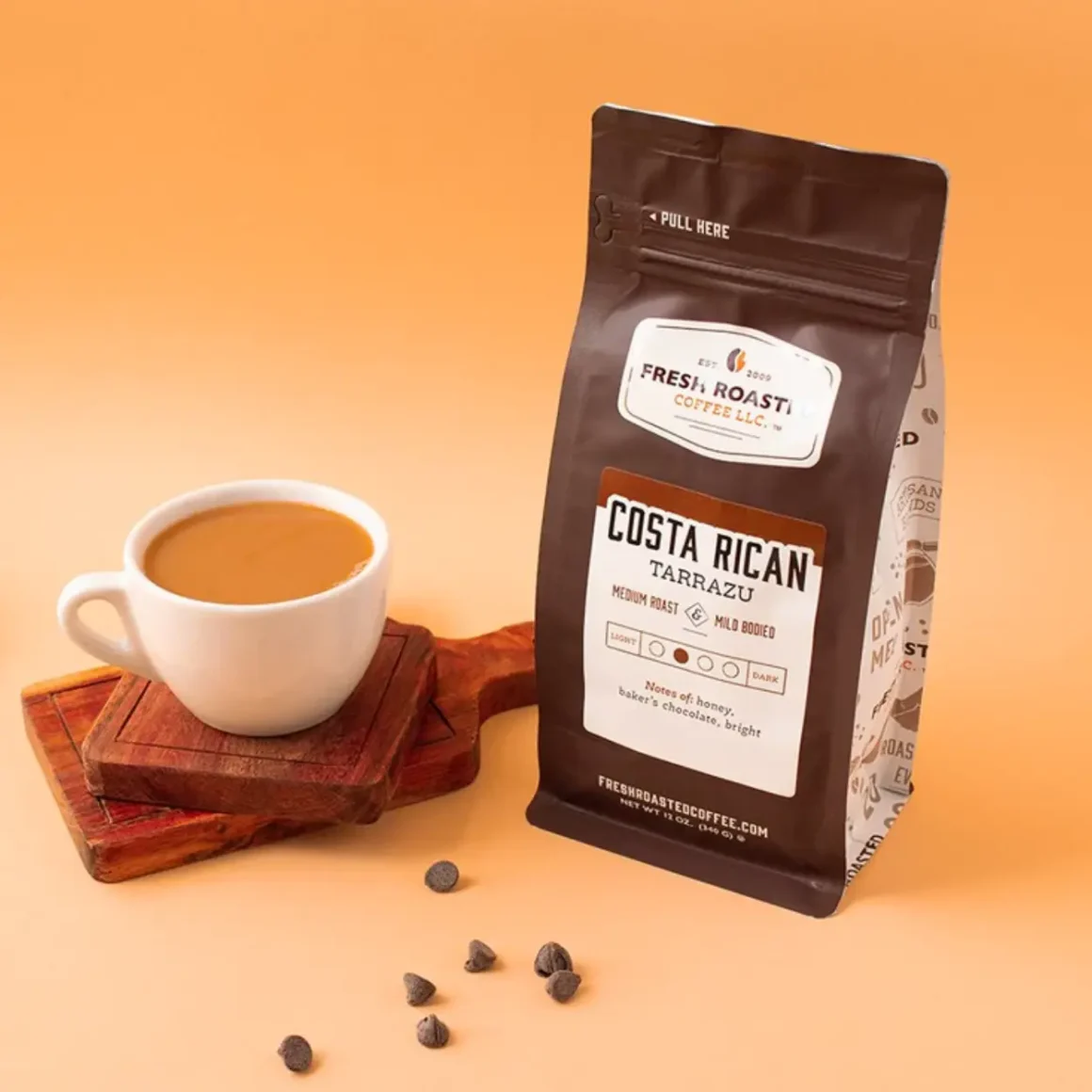
This brand is ideal for coffee enthusiasts who prefer a bold, vibrant coffee experience. The bright acidity and sweet notes of honey and chocolate cater to those who enjoy a medium-bodied coffee with distinct flavor characteristics. It’s also a great choice for socially responsible consumers, as the brand emphasizes ethical production practices, including benefits for coffee pickers and producers. This coffee is well-suited for individuals looking for a rich and engaging taste, coupled with the satisfaction of supporting ethical and sustainable coffee farming practices.
Features:
- Available Sizes: From 2.5 oz samples to 30 lbs bulk packs.
- Grind Options: Whole bean, drip grind, coarse grind, fine grind.
- Roast Level: Medium, introducing Maillard notes.
- Roast Body: Mild, offering a tea-like and smooth experience.
- Cupping Notes: Bright, with hints of honey and chocolate.
- Processing: Washed process; drum drying.
- Coffee Varietal: Caturra, Catuai.
Pros:
- Extensive size and grind variety.
- Bright and inviting flavor notes of honey and chocolate.
- Ethical production with benefits for workers.
Cons:
- The mild roast body may not appeal to those who prefer a fuller body.
- This specific flavor profile might not suit all tastes.
Guru’s Insights:
This brand stands out for its combination of ethical production and rich, vibrant flavors. The bright acidity and honey-chocolate notes make it an excellent choice for those who enjoy a medium-bodied coffee. Its ethical practices add to its appeal, aligning with the growing demand for socially responsible coffee options.
Tarrazú Costa Rican Montecielo by Café Britt

No products found.
Café Britt’s Montecielo is tailor-made for those who value both the taste and the story behind their coffee. The medium roast with its chocolatey essence and subtle grapefruit undertones will appeal to those who prefer a coffee with a unique and refined flavor profile. This brand is particularly appealing to environmentally conscious drinkers, given its commitment to carbon neutrality and sustainable practices. It’s also a perfect match for consumers who appreciate coffee that is roasted and packaged in its country of origin, ensuring peak freshness and supporting local economies. This coffee is an excellent choice for those who seek a harmonious blend of quality, sustainability, and rich, distinctive flavors.
Features:
- Local Roasting: Ensures freshness by undergoing the entire process in Costa Rica.
- Carbon Neutrality: Committed to reducing emissions since 2013.
- Quality Assurance: 100% Arabica, kosher, and gluten-free.
- Flavor Profile: Medium roast highlighting chocolatey essence and subtle grapefruit undertones.
- Origin: Sourced from cooperative farms in the renowned Tarrazú region.
- Sustainability: Focuses on efficient use of natural resources and fair practices.
Pros:
- Local roasting maximizes freshness.
- Carbon-neutral certification appeals to environmentally conscious consumers.
- Unique flavor profile with chocolate and grapefruit notes.
- Strong commitment to sustainability and ethical practices.
Cons:
- Limited variety in terms of roast levels and grind options.
- Flavor notes may not appeal to those who prefer classic coffee tastes.
Guru’s Insights:
Café Britt’s Tarrazú Costa Rican Montecielo is a top recommendation for its meticulous attention to quality and sustainability. The unique flavor profile, which is a result of the medium roast and Tarrazú’s rich soil, provides a distinct tasting experience. This brand is perfect for those who value both taste and ethical production in their coffee selection.
Costa Rica Tarrazú Decaf Coffee by Volcanica
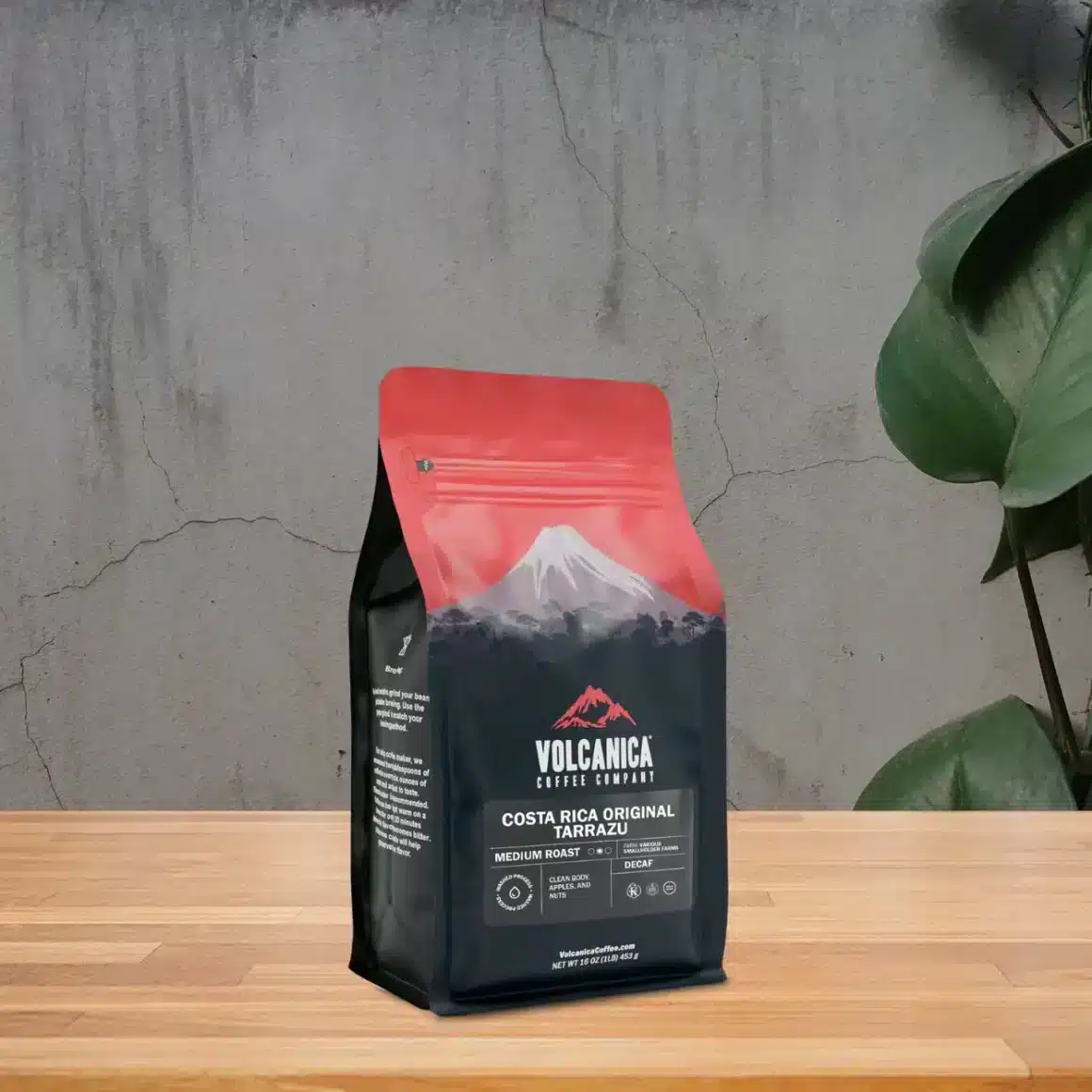
Coffee enthusiasts who prefer a decaffeinated option without sacrificing the rich, authentic taste of Costa Rica’s Tarrazú coffee. This coffee is especially suitable for those who are sensitive to caffeine or prefer to enjoy their coffee later in the day. It’s also an excellent choice for health-conscious individuals, given its chemical-free decaffeination process.
Features:
- Size Variations: Available in 16 Oz., 3 Lbs. (3 Pack), and 5 Lb. Bag options.
- Grind Options: Offers whole bean, drip grind, espresso grind, and French press.
- Flavor Notes: Features a clean body with hints of apples and nutty undertones.
- Processing: Utilizes the Swiss Water Process for decaffeination, ensuring 99.9% caffeine-free coffee.
- Roast: Medium roast, though it may appear darker due to the Swiss Water Process.
- Additional Information: Uses patio and mechanical drying methods; sourced from various smallholder Tarrazú farms; has a pH of 5.1; single-origin coffee.
Pros:
- Wide range of sizes and grind options to suit different brewing preferences.
- The Swiss Water Process ensures a high-quality decaf experience without chemical additives.
- Maintains the distinct flavor profile typical of Tarrazú coffee despite being decaffeinated.
- Suitable for those who prefer or need a low-caffeine option.
Cons:
- The appearance of the roast may be misleading, resembling a dark roast.
- The unique decaf process might alter the expected taste profile for some coffee drinkers.
Guru’s Insights:
Volcanica’s Costa Rica Tarrazú Decaf Coffee is a superb choice for those seeking a high-quality decaf coffee with a complex flavor profile. The use of the Swiss Water Process preserves the coffee’s natural flavors and characteristics, making it a standout option among decaffeinated coffees. Its ethical and health-conscious processing, along with the rich taste profile, makes it a top pick for both decaf lovers and those exploring decaf options.
What is Costa Rica Tarrazú Coffee?
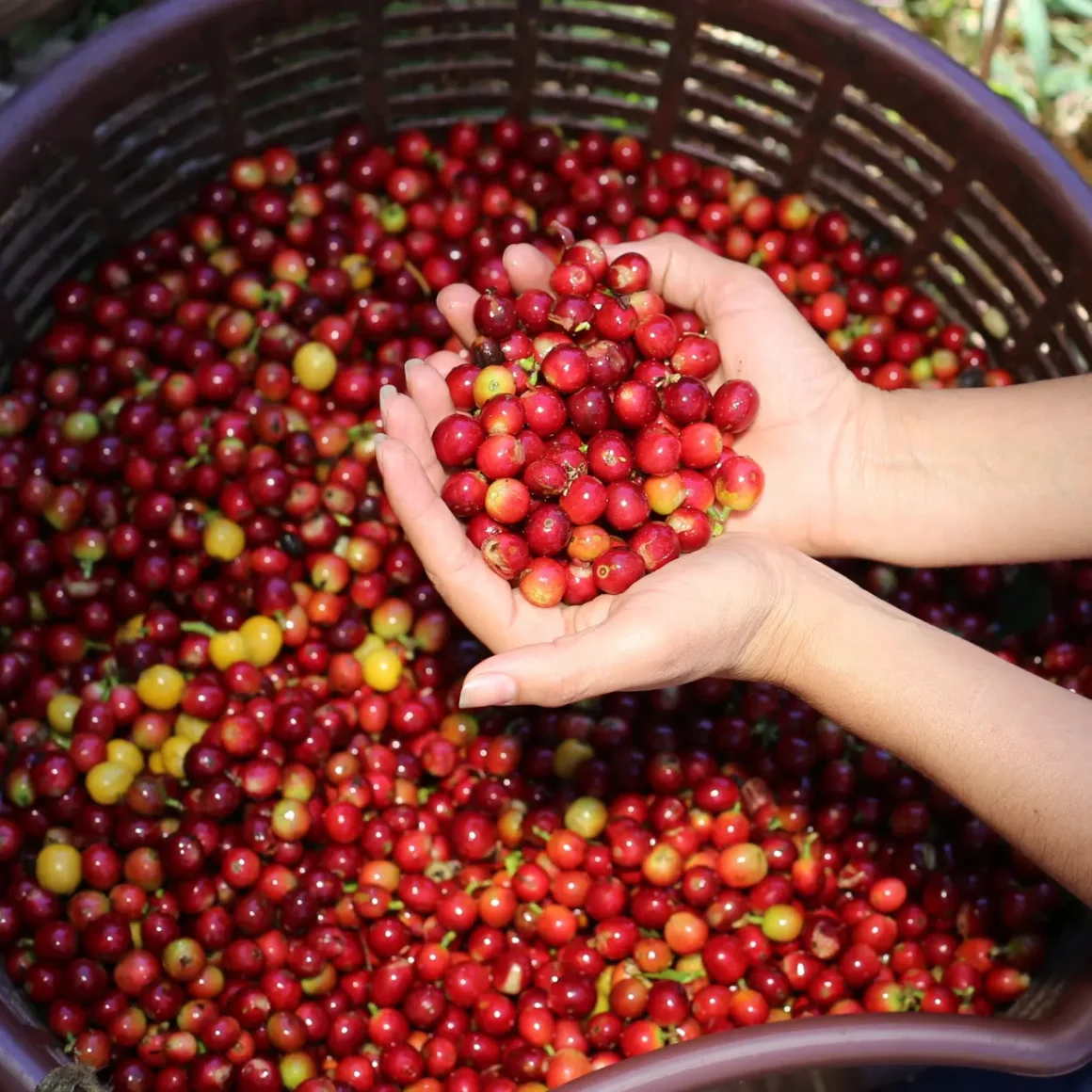
Costa Rica Tarrazú coffee (pronounced “tah-RAH-zoo”) represents a remarkable blend of history, tradition, and unique flavors, making it one of the world’s most sought-after coffee varieties. Grown in the fertile highlands of Costa Rica, this coffee is celebrated for its exceptional quality and distinctive taste.
Origins and History
Tracing back to the late 18th century, Costa Rica Tarrazú coffee has a rich heritage, deeply ingrained in the Costa Rican coffee tradition. This segment explores how this coffee became a cornerstone of Costa Rican agriculture and economy.
- Beginning in the Meseta Central: Coffee production in Costa Rica started in 1779 in the Meseta Central, known for its ideal soil and climatic conditions for coffee cultivation.
- Government Promotion in the 19th Century: The Costa Rican government played a significant role in promoting coffee production, transforming the economy from a colonial regime to an organized, export-oriented coffee industry.
- Rise as a Primary Revenue Source: By 1829, coffee had surpassed other crops like cacao and tobacco as the primary source of revenue in Costa Rica.
- International Expansion: The 19th century saw Costa Rican coffee reaching international markets, including direct exports to the United Kingdom, marking the beginning of significant British investments in the industry.
Unique Characteristics and Flavor Profile
Costa Rica Tarrazú coffee is distinguished by its unique flavor profile, shaped by the region’s geography and climate. Here, we explore the sensory qualities that make Tarrazú coffee a favorite among coffee aficionados worldwide.
- Altitude and Growing Season: The best quality coffee is cultivated at altitudes between 1,200 and 1,900 meters during a shorter winter growing season.
- Flavor Distinctions: Tarrazú coffee is known for its excellent body, high acidity, and a fine, smooth taste, often featuring a magnificent aroma with subtle chocolate flavors.
- Ideal Growing Conditions: Costa Rica’s dry and rainy seasons provide the perfect conditions for cultivating coffee, with over 70% of it grown in mountainous regions enriched with volcanic ash.
- Harvesting Period: The harvesting period typically spans from December to March-April, capitalizing on the region’s specific climatic conditions to ensure optimal bean ripeness and flavor.
The Coffee Cultivation Process in Tarrazú
The cultivation process in Tarrazú is a testament to the region’s commitment to quality and sustainability. This part examines the detailed process that contributes to the exceptional quality of Tarrazú coffee.
- Role of Cooperatives: Coope Tarrazu RL, established in 1960, plays a critical role in the region’s coffee production, supporting small farms with services like technical assistance and sustainable practice support. (1)
- Sustainable Practices: The cooperative emphasizes sustainability, converting coffee pulp into organic fertilizer and using solar panels for energy.
- Awards and Recognition: Tarrazú’s high-quality coffee is consistently acknowledged, receiving accolades such as the Cup of Excellence for its superior taste and quality.
Costa Rica Tarrazú coffee’s rich history, unique flavor profile, and dedicated cultivation process make it a standout in the world coffee market, embodying the essence of Costa Rican coffee culture.
The Art of Brewing the Perfect Cup of Tarrazú Coffee

Mastering the art of brewing Tarrazú coffee is key to fully experiencing its rich and unique flavor profile. This section covers everything from selecting and roasting the beans to brewing techniques and food pairings, ensuring you enjoy the best of what Tarrazú coffee has to offer.
Selection and Roasting of Beans
Selecting and roasting Tarrazú beans is a crucial step in enhancing their inherent flavors. This process lays the foundation for the coffee’s final taste.
- Bean Selection: Choosing high-quality, fresh Tarrazú beans is essential. Look for beans that have a uniform appearance and are free from defects.
- Roasting: The roasting process greatly influences the coffee’s flavor. Tarrazú beans are typically roasted to a medium level to balance acidity and body, highlighting their chocolatey and fruity notes.
- Freshness: Always opt for freshly roasted beans to ensure the best flavor, and store them properly to maintain their freshness.
Brewing Techniques and Recommendations
The brewing method plays a significant role in the flavor of your coffee. Let’s explore some techniques that are particularly well-suited for Tarrazú coffee.
- Best Costa Rican Coffee Maker – Chorreador: The traditional Costa Rican chorreador, a simple drip coffee maker, is excellent for brewing Tarrazú coffee. It allows for a clean extraction that highlights the coffee’s natural flavors.
- Grinding: The grind size should match your brewing method. For a chorreador, a medium grind works best.
- Water Quality and Temperature: Use filtered water heated to about 195°F to 205°F. The right temperature extracts the coffee’s flavors without over-extracting and causing bitterness.
Pairing Tarrazú Coffee with Foods
Pairing Tarrazú coffee with the right foods can enhance both the coffee and the culinary experience.
- Sweet Pairings: The chocolate and fruity notes of Tarrazú coffee pair wonderfully with sweet pastries, such as croissants or fruit tarts.
- Savory Options: For a savory pairing, try Tarrazú coffee with a rich breakfast of eggs and bacon, where its acidity can cut through the richness of the food.
- Cheese Pairings: Aged cheeses, like Gouda or Cheddar, complement the nutty undertones in Tarrazú coffee, creating a delightful balance.
By understanding the intricacies of bean selection, brewing techniques, and food pairings, you can elevate your Tarrazú coffee experience, ensuring each cup is as enjoyable as it is memorable.
Sustainability and Ethical Practices in Tarrazú Coffee Production
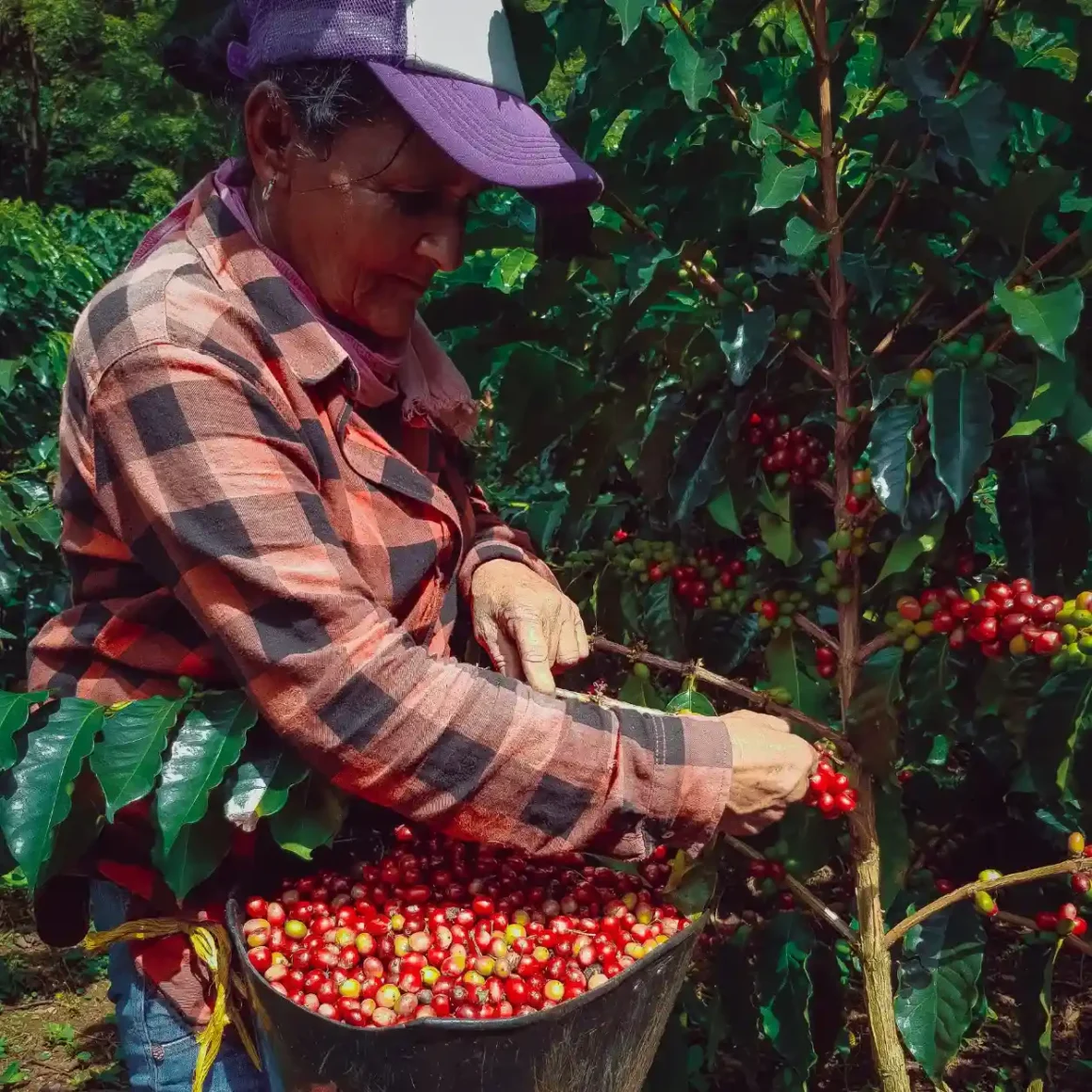
In the Tarrazú region of Costa Rica, the sustainability and ethical practices in coffee production are evolving, driven by global interest in sustainable coffee certifications. This section will explore how these certifications are being implemented in the region, focusing on their impact on farming practices and the challenges faced at both the farm and cooperative levels.
Environmental Stewardship in Coffee Farming
Environmental stewardship in Tarrazú’s coffee farming is increasingly shaped by certification standards, though the practical application of these standards can vary.
- Implementation of Certification Guidelines: Two neighboring coffee cooperatives in Tarrazú reveal varied levels of awareness and application of environmental certifications among farmers.
- Impact on Farming Practices: Certifications like Fairtrade, C.A.F.E. Practices, and Rainforest Alliance have led to more environmentally friendly practices, such as reduced herbicide use and the incorporation of shade-providing plants.
- Challenges in Adoption: Despite these positive changes, there are challenges, including new pests, farmers’ perceptions of organic fertilizers, and the practicality of soil amendments.
Fair Trade and Economic Impact on Local Communities
Fair trade certifications in Tarrazú impact local communities, but the extent of this impact is influenced by various factors at the farm and cooperative levels.
- Awareness and Participation: The study shows that farmers certified under group programs like Fairtrade and C.A.F.E. Practices often have limited awareness of their participation. (2)
- Indirect Influence of Certifications: Group certifications tend to indirectly influence farming practices through cooperative services rather than direct farmer engagement.
- Balancing Productivity and Sustainability: Cooperatives face the challenge of balancing productivity goals with environmental sustainability, emphasizing the need for strengthened capacities and technical assistance.
Innovations in Sustainable Coffee Production
Innovations in sustainable coffee production in Tarrazú are closely linked to the integration and implementation of certification standards.
- Adoption of Eco-Friendly Practices: The introduction of certifications has prompted a shift toward more sustainable practices, albeit with varying degrees of change across different certifications.
- Constraints at Cooperative Level: Key constraints include the dissemination of information about certification standards and balancing environmental goals with productivity.
- Need for Enhanced Support: The findings highlight the importance of enhancing cooperative capacities to promote sustainable farming practices effectively.
Overall, while certifications have brought positive changes to Tarrazú’s coffee farming, the success of these initiatives depends on overcoming challenges at both the farm and cooperative levels. Strengthening cooperative capacities and providing targeted technical assistance are crucial for ensuring the effective implementation of sustainable practices.
Conclusion
Costa Rica Tarrazú coffee stands as a beacon of quality in the coffee world. Its rich aroma and distinct flavor profile are products of the ideal growing conditions in Costa Rica, combined with the dedication and expertise of local farmers. Emphasizing environmental stewardship and sustainable practices, this coffee not only delights the senses but also reflects a commitment to ethical and responsible agriculture. The experience of coffee Costa Rica Tarrazú goes beyond taste, embodying a blend of cultural heritage and modern farming excellence, making each cup a unique and memorable experience.
FAQ
How Does the Geography of Tarrazú Influence Its Coffee Flavor?
The geography of Tarrazú, with its high altitude and rich volcanic soil, contributes to the coffee's bright acidity and rich, diverse flavors.
What Are the Best Brewing Methods for Tarrazú Coffee?
The best brewing methods for Tarrazú coffee include using a traditional Costa Rican chorreador or other methods that highlight its acidity and rich flavor, like pour-over or French press.
How Does Tarrazú Coffee Contribute to Sustainable Practices in Coffee Production?
Tarrazú coffee contributes to sustainable practices through its commitment to environmental stewardship, including biodiversity conservation and reduced chemical usage.
What Role Does Tarrazú Coffee Play in Costa Rican Culture and Economy?
Tarrazú coffee plays a pivotal role in Costa Rican culture and economy as a symbol of national pride and a major contributor to the country's agricultural exports.
